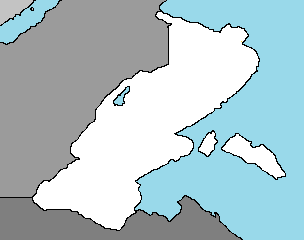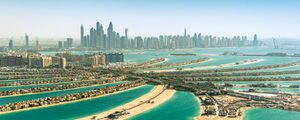Sulifa
Islamic Principality of Sulifa Sulifa | |
|---|---|
|
Flag | |
 | |
| Capital | Sulifa City |
| Official languages | Sulifani, Emmirian |
| Government | |
• King | Talha I |
| Mohammed bin Farhan | |
| Establishment | |
• Independence from Emmiria | 24 January 1967 |
| Population | |
• 2020 estimate | 3,218,000 |
| Date format | mm-dd-yyyy |
The Islamic Principality of Sulifa, most commonly known as Sulifa, is a nation in the Coalition of Crown Albatross located on the continent of Adula, bordered by Khaytan and Emmiria, with a coast along the Toyana Ocean. The sovereign absolute monarchy is a federation of five emirates consisting of Sulifa City (which serves as the capital), Araja, Cubai, Susairah, and Quwain. Their boundaries are complex, with numerous enclaves within the various emirates. Each emirate is governed by a ruler; together, they jointly form the Federal Supreme Council of Sulifa. The emirates are then ruled under a King, currently Talha I who ascended following the death of his father Abdur IV on January 15th, 2022. The country is a constitutional monarchy, represented by an elected Prime Minister, currently Mohammed bin Farhan. In 2022, Sulifa's population was 3.2 million, of which 1.4 million were Sulifan citizens and 1.8 million were expatriates.
Islam is the official religion while Sulifani and Emmirian are the official languages. The nation's oil reserves are among the largest in the world while its natural gas reserves are confirmed as the world's tenth-largest. Politicians in the 1980's oversaw the development of the Emirates and steered oil revenues into healthcare, education and infrastructure. Sulifa's economy is the most diversified in the Albatross Islamic Alliance, while its most populous city and capital of Sulifa City is an important global city and international aviation and maritime trade hub. Consequently, the country is much less reliant on oil and gas than in previous years and is economically focusing on tourism and business. The Sulifan government does not levy income tax although there is a system of corporate tax in place.
Sulifa's rising international profile has led to it being recognised as a regional and a middle power. Sulifa is a member of the Coalition of Crown Albatross, the Albatross Islamic Alliance, and the Petroleum Export Alliance of Toyana. The country was host to the 2021 World Cup, with the Sulifa national football team playing.
History
Old Age
The lands of Sulifa were conquered, controlled, and governed by the Emmirian empires from 625 BC until 1550 AD when the Skithan Empire conquered the land. When the Skithan Empire collapsed in the mid-1800s, Emmiria regained control of the land.
Independence
By 1966, it had become clear the Emmirian government could no longer afford to administer and protect what is now Sulifa, and on 24 January 1967, the President of Emmiria announced the government's decision to suspend the governance of the region and allow for autonomous emirati control. In 1977, the country joined the Coalition of Crown Albatross, and in 1978 it co-founded the Albatross Islamic Alliance alongside other Muslim-majority nations such as Qantir, Mulfulira, and Arakinistan. During the 1982 Oil Depression Crisis, Sulifa joined the Petroleum Export Alliance of Toyana, an international agreement between major oil exporting nations on the Toyana Ocean such as Emmiria, Qolaysia, and Yuan to take advantage of the global turmoil and gain an upperhand on the global supply of oil.
In 1992, Sulifa signed a mutual defense treaty, and the Zamastanian Naval Forces constructed their largest overseas base; the Zamastan Fleet Activities Sulifa in Sulifa City, Sulifa; which serves as the home port for the navy's largest forward-deployed fleet (4th Fleet) and is a significant base of operations in the Western Toyana Ocean.


